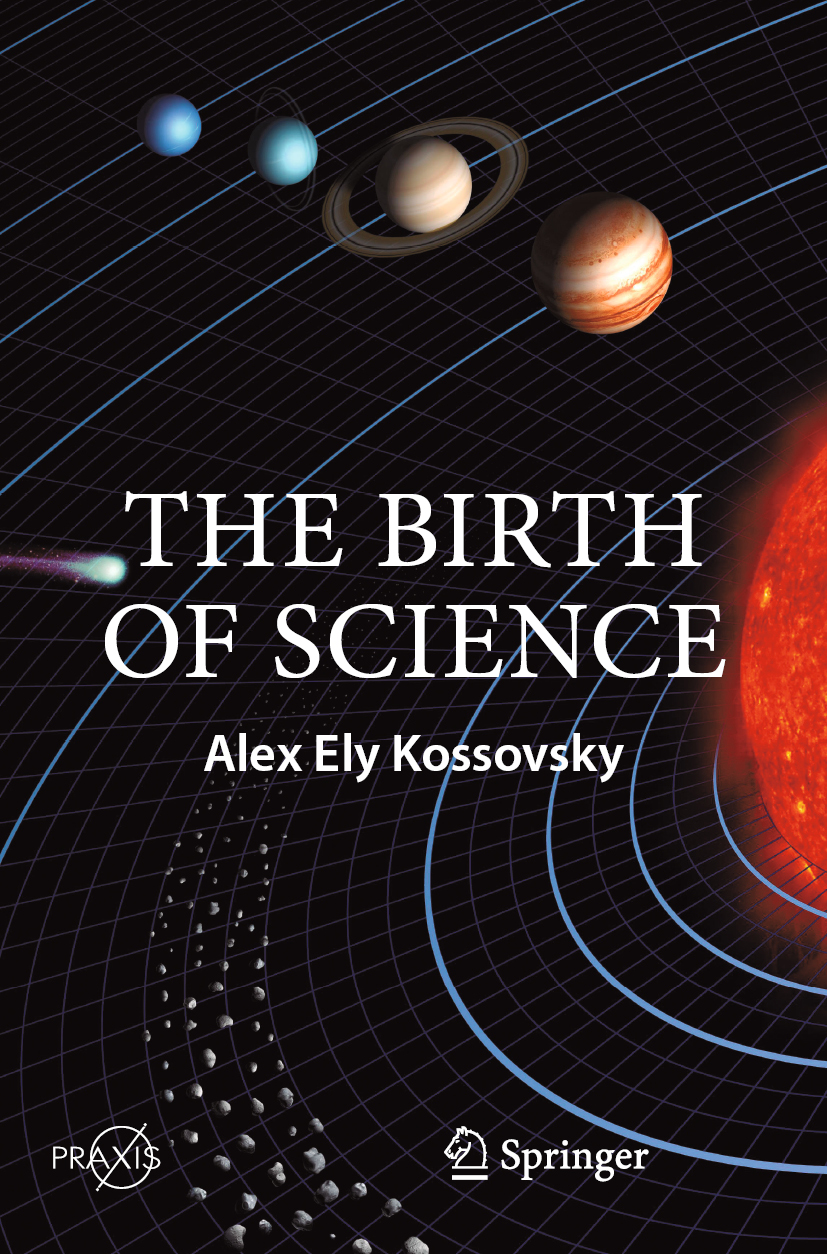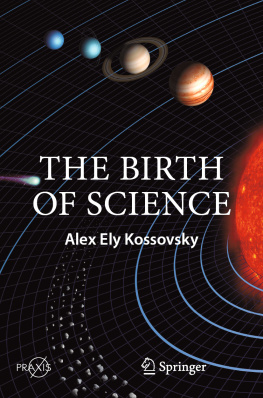Alex Ely Kossovsky - The Birth of Science
Here you can read online Alex Ely Kossovsky - The Birth of Science full text of the book (entire story) in english for free. Download pdf and epub, get meaning, cover and reviews about this ebook. publisher: Springer International Publishing, genre: Science fiction. Description of the work, (preface) as well as reviews are available. Best literature library LitArk.com created for fans of good reading and offers a wide selection of genres:
Romance novel
Science fiction
Adventure
Detective
Science
History
Home and family
Prose
Art
Politics
Computer
Non-fiction
Religion
Business
Children
Humor
Choose a favorite category and find really read worthwhile books. Enjoy immersion in the world of imagination, feel the emotions of the characters or learn something new for yourself, make an fascinating discovery.
- Book:The Birth of Science
- Author:
- Publisher:Springer International Publishing
- Genre:
- Rating:5 / 5
- Favourites:Add to favourites
- Your mark:
- 100
- 1
- 2
- 3
- 4
- 5
The Birth of Science: summary, description and annotation
We offer to read an annotation, description, summary or preface (depends on what the author of the book "The Birth of Science" wrote himself). If you haven't found the necessary information about the book — write in the comments, we will try to find it.
The Birth of Science — read online for free the complete book (whole text) full work
Below is the text of the book, divided by pages. System saving the place of the last page read, allows you to conveniently read the book "The Birth of Science" online for free, without having to search again every time where you left off. Put a bookmark, and you can go to the page where you finished reading at any time.
Font size:
Interval:
Bookmark:

This book series presents the whole spectrum of Earth Sciences, Astronautics and Space Exploration. Practitioners will find exact science and complex engineering solutions explained scientifically correct but easy to understand.Various subseries help to differentiate between the scientific areas of Springer Praxis books and to make selected professional information accessible for you.
More information about this subseries at http://www.springer.com/series/8158


This Springer imprint is published by the registered company Springer Nature Switzerland AG
The registered company address is: Gewerbestrasse 11, 6330 Cham, Switzerland
This book has been written for two distinct audiences, and without the slightest internal contradiction, namely, for the educated general public who are not necessarily proficient in mathematics and physics, as well as for expert physicists, other scientists, mathematicians, and statisticians, who I hope will find many sections of the book to be thought-provoking and informative at their own professional level. The four chapters marked as optional require a somewhat higher level of mathematical skills on the part of the reader, and could be skipped by the general reader without any loss of continuity, and without diminishing their ability to understand the rest of the book. It should be noted that the notation for the multiplication of A by B is conveniently denoted here in a variety of ways, such as AxB, A*B, AB; and that conventionally, squares, namely NxN, are denoted as N2, and cubes, namely NxNxN, are denoted as N3. Feedback, questions, suggestions, or criticism about the content of the book could be sent to the email address akossovsky@gmail.com, and would be warmly welcome by the author.
If I have seen further than others, it is by standing upon the shoulders of giants.
Isaac Newton
The senses deceive from time to time, and it is prudent never to trust wholly those who have deceived us even once.
Ren Descartes
If you would be a real seeker after truth, it is necessary that at least once in your life you doubt, as far as possible, all things.
Ren Descartes
Geometry was co-eternal with the Divine Mind prior to the birth of all things.
Johannes Kepler
Mathematics is the language in which God wrote the universe.
Galileo Galilei
Keplers Celestial Data Analysis,
Galileos Terrestrial Experiments,
Newtons Grand Synthesis,
Midwifing the Birth of Science.
I would like to express my profound gratitude to the late Professor Edward Binkowski, my mentor and the former director of the Applied Mathematics and Statistics Department at the City University of New York, who passed away last year. I thank him for teaching a broader, more balanced and open-minded approach regarding issues in mathematical statistics and philosophy of science, as well as for his support and encouragement leading eventually to the writing of this book. I would also like to extend my heartfelt thanks to Professor George Feuerlicht of Prague University of Economics and Sydney University of Technology, for his unfailing loyalty, support, and enthusiasm for this book, as well as for his thorough and brutal purge of typos from my original manuscript. Lastly, I would like to express my gratitude and appreciation to the distinguished physicist and author Professor Don Lemons, and to Emeritus Professor of Cognitive Sciences Walter Makous, for their scientific insights and comments, for their constant support, and for Walters reviewing of the prose in the book.
Nicolaus Copernicus | (14731543) |
Tycho Brahe | (15461601) |
Johannes Kepler | (15711630) |
Galilei Galileo | (15641642) |
Ren Descartes | (15961650) |
Isaac Newton | (16421727) |
It was the continent of Europe, during the transformative era of the Renaissance, where this remarkable revolution in knowledge took place. Yet, Europe at that era was neither peaceful nor prosperous; rather it was largely a continent suffering from superstition and ignorance; ruled mostly by exploitative and despotic kings. More benevolent and humanistic rulers who supported the arts and the sciences were the exception. It was also a continent torn by brutal and senseless wars, mostly in order to enhance this or that dynastic royal family, and also in part due to the violent schism between the newly formed Lutheran Church established by Martin Luther in the Protestant Reformation, and the older and well-established Catholic Church.
Font size:
Interval:
Bookmark:
Similar books «The Birth of Science»
Look at similar books to The Birth of Science. We have selected literature similar in name and meaning in the hope of providing readers with more options to find new, interesting, not yet read works.
Discussion, reviews of the book The Birth of Science and just readers' own opinions. Leave your comments, write what you think about the work, its meaning or the main characters. Specify what exactly you liked and what you didn't like, and why you think so.











